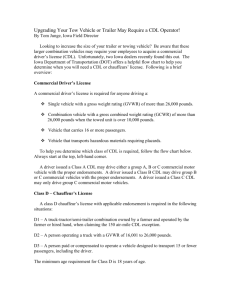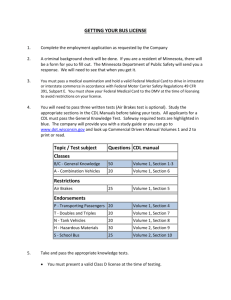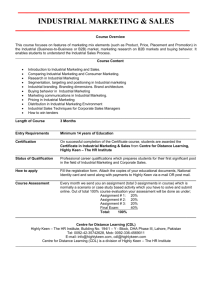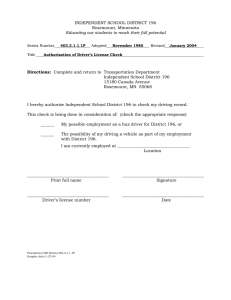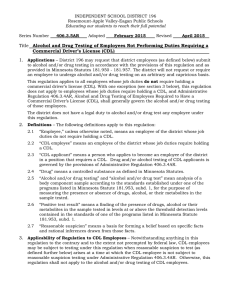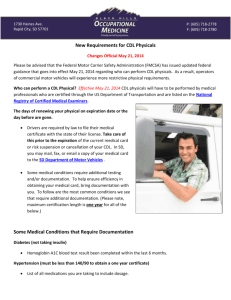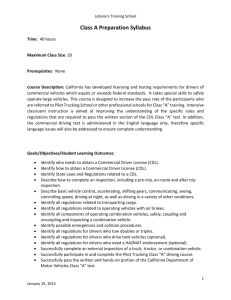INDEPENDENT SCHOOL DISTRICT 196 Rosemount-Apple Valley-Eagan Public Schools 406
advertisement
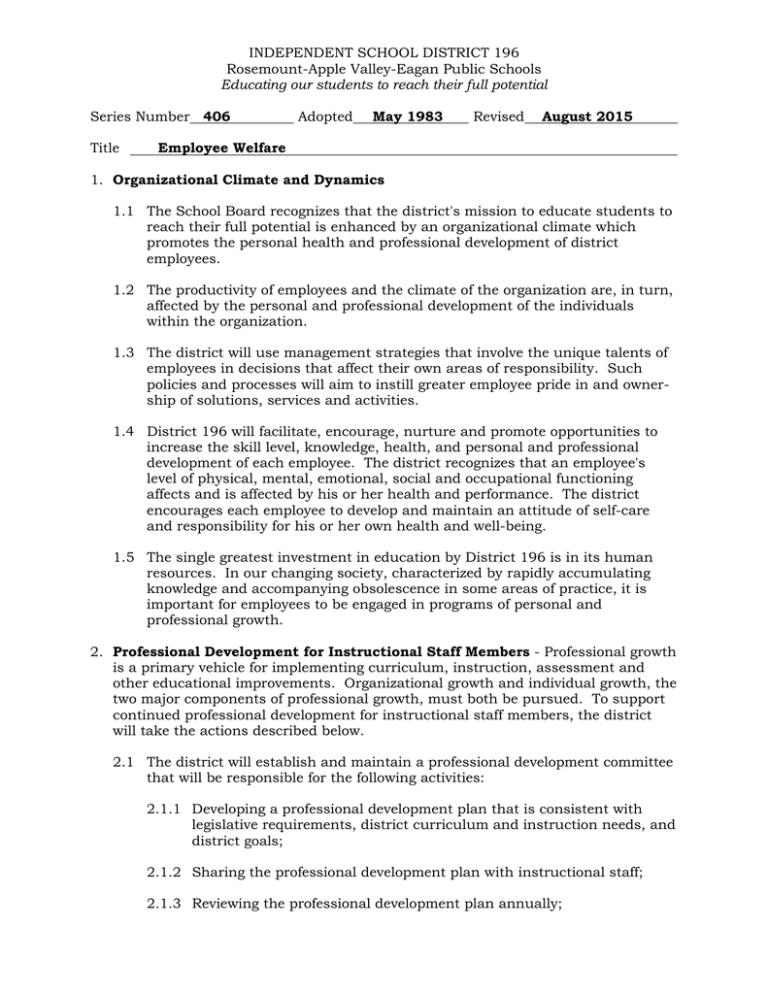
INDEPENDENT SCHOOL DISTRICT 196 Rosemount-Apple Valley-Eagan Public Schools Educating our students to reach their full potential Series Number 406 Title Adopted May 1983 Revised August 2015 Employee Welfare 1. Organizational Climate and Dynamics 1.1 The School Board recognizes that the district's mission to educate students to reach their full potential is enhanced by an organizational climate which promotes the personal health and professional development of district employees. 1.2 The productivity of employees and the climate of the organization are, in turn, affected by the personal and professional development of the individuals within the organization. 1.3 The district will use management strategies that involve the unique talents of employees in decisions that affect their own areas of responsibility. Such policies and processes will aim to instill greater employee pride in and ownership of solutions, services and activities. 1.4 District 196 will facilitate, encourage, nurture and promote opportunities to increase the skill level, knowledge, health, and personal and professional development of each employee. The district recognizes that an employee's level of physical, mental, emotional, social and occupational functioning affects and is affected by his or her health and performance. The district encourages each employee to develop and maintain an attitude of self-care and responsibility for his or her own health and well-being. 1.5 The single greatest investment in education by District 196 is in its human resources. In our changing society, characterized by rapidly accumulating knowledge and accompanying obsolescence in some areas of practice, it is important for employees to be engaged in programs of personal and professional growth. 2. Professional Development for Instructional Staff Members - Professional growth is a primary vehicle for implementing curriculum, instruction, assessment and other educational improvements. Organizational growth and individual growth, the two major components of professional growth, must both be pursued. To support continued professional development for instructional staff members, the district will take the actions described below. 2.1 The district will establish and maintain a professional development committee that will be responsible for the following activities: 2.1.1 Developing a professional development plan that is consistent with legislative requirements, district curriculum and instruction needs, and district goals; 2.1.2 Sharing the professional development plan with instructional staff; 2.1.3 Reviewing the professional development plan annually; Policy 406 Page 2 2.1.4 Revising the professional development plan as needed, based on data gathered from student test scores, program evaluation and other relevant measures; 2.1.5 Advising site-level professional development committees; 2.1.6 Evaluating site-level professional development efforts, and 2.1.7 Reporting professional development activities in the district to the Minnesota Department of Education. 2.2 The district will maintain and, as appropriate, extend its collaborative efforts with institutions of higher learning. The efforts may include, but need not be limited to, the following activities: 2.2.1 Graduate courses taught by college and district staff, and 2.2.2 Opportunities for collegial interaction and intellectual stimulation. 2.3 The district will provide support for new instructional staff members, and work to improve the performance and enhance professional growth for all tenured instructional staff. 2.4 The district will communicate information about professional development opportunities to instructional staff. 2.5 The district will assist the sites in the development and implementation of their professional development plans by sharing information about state and district goals and needs, and by helping to plan inservice activities. 3. Chemical-Free Workplace - District 196 will create, promote and enforce a chemical-free workplace for all district employees. 3.1 Employees are prohibited from manufacturing, distributing, dispensing, transferring, possessing, using or being under the influence of any chemical in the workplace. 3.1.1 "The workplace" is defined as on district property, in district vehicles or wherever a district employee is considered to be on duty. 3.1.2 "Under the influence" means that a chemical has been consumed in an amount sufficient to have a noticeable effect on behavior and/or ability to perform job functions. 3.1.3 For the purposes of this policy and related regulations, "chemicals" (which includes drugs and alcohol) are defined as any substance that has a profound and rapid mood-altering or intoxicating effect on the central nervous system and includes those chemicals that are illegal as defined by state and federal laws, or legal by physician's prescription only, but obtained and/or used in non-prescribed ways. “Chemicals” also includes medical cannabis when a person uses, possesses or is impaired by medical cannabis while working or on district property (including a school bus or vehicle). Policy 406 Page 3 3.2 Employees who use a controlled substance under a physician’s care and prescription shall carry the substance in the original container (with the prescriber’s and pharmacist’s identification on it) and may be required to provide documentation from the physician. 3.2.1 Employees using a prescription drug which may impair mental or motor function shall inform their supervisor of such drug use. 3.2.2 Employees required to hold a commercial driver’s license (CDL) as a qualification of their employment (including school bus drivers, truck drivers, groundskeepers, Transportation Department special staff and administrators, and mechanics) who are also using a prescription drug which may impair mental or motor function may be given other duties or placed on temporary medical leave until released as fit for duty by the prescribing physician. 3.2.3 Notwithstanding anything to the contrary in this policy, under no circumstances are employees permitted to use or be in possession of marijuana (THS metabolite) on district property (including a school bus or vehicle) or be impaired by marijuana while working. This prohibition applies to employees who are lawfully enrolled in the medical cannabis registry program established under Minnesota Statutes 152.22 to 152.37. 3.3 An employee must notify his or her supervisor in writing within five calendar days of being convicted of a criminal drug statute violation in the workplace. 3.4 Alcohol and Drug Testing of Employees Required to Hold a Commercial Driver’s License (CDL) 3.4.1 Employees who are required to hold a commercial driver’s license (CDL) as a qualification of their employment (including school bus drivers; truck drivers; groundskeepers; and Transportation Department special staff, administrators and mechanics -- known as “safety-sensitive employees” in federal law) are required to undergo alcohol and drug testing in accordance with rules established by the Federal Highway Administration. 3.4.1.1 The employees listed above will be subject to the following required types of alcohol and drug tests: pre-employment, post-accident, reasonable suspicion, random, and return-toduty and follow-up. 3.4.1.2 The drugs for which employees will be tested are marijuana (THC metabolite), cocaine, amphetamines, opiates (including heroin) and phencyclidine (PCP). 3.4.1.3 Employee alcohol and drug testing records are confidential. Test results and other confidential information will only be released to the employee’s supervisor(s), district personnel officials and the substance abuse professional who is evaluating the employee. Policy 406 Page 4 3.4.2 No employee required to hold a CDL shall: 3.4.2.1 Use alcohol or be under the influence of alcohol within four hours before going on duty or operating or having physical control of a commercial motor vehicle; 3.4.2.2 Use alcohol, be under the influence of alcohol or have any measured alcohol concentration or detected presence of alcohol while on duty or operating or in physical control of a commercial motor vehicle; 3.4.2.3 Be on duty or operate a commercial motor vehicle while in possession of an alcoholic beverage; 3.4.2.4 Be on duty or operate a commercial motor vehicle if, by his or her general appearance or conduct or by other substantiating evidence, he or she appears to have used alcohol within the preceding four hours, or 3.4.2.5 Engage in the illicit use of drugs on or off duty. 3.4.3 The district will provide employees required to hold a CDL with education and training on how alcohol and drugs might affect them and the work environment, and will provide supervisors of such employees with training on how to document behavioral changes in employees who might be abusing drugs. 3.5 Alcohol and Drug Testing of Employees Not Performing Duties Requiring a Commercial Driver’s License (CDL) 3.5.1 The district may request that employees not performing duties requiring a CDL submit to alcohol and/or drug testing in accordance with the provisions of Administrative Regulation 406.3.5AR, Alcohol and Drug Testing of Employees Not Performing Duties Requiring a Commercial Driver’s License (CDL), and as provided in Minnesota Statutes 181.950 - 181.957. The district will not request or require an employee to undergo alcohol and/or drug testing on an arbitrary and capricious basis. 3.5.2 Notwithstanding anything in Administrative Regulation 406.3.5AR to the contrary and to the extent not preempted by federal law, CDL employees may be subject to testing under Administrative Regulation 406.3.5AR when reasonable suspicion to test arises at a time at which the CDL employee is not subject to reasonable suspicion testing under Administrative Regulation 406.3.4AR, Alcohol and Drug Testing of Employees Required to Have a Commercial Driver’s License (CDL). Otherwise, Administrative Regulation 406.3.5AR shall not apply to the alcohol and/or drug testing of CDL employees. 3.5.3 Employees subject to testing shall be tested only when there is a reasonable suspicion to test, as defined by section 4 of Administrative Regulation 406.3.5AR. Policy 406 Page 5 3.5.4 Testing will be performed by approved laboratories and using established chain-of-custody protocols. 3.5.5 Written notice of the district’s alcohol and drug testing policy for employees not performing duties requiring a CDL will be provided to affected employees and posted in an appropriate and conspicuous location at each district site. The policy will also be available for inspection and copying at each site. 3.5.6 An employee has the right to refuse testing, but the refusal by an employee to take a required test will be documented by the employee’s supervisor and appropriate disciplinary action will be taken in accordance with state law and/or applicable collective bargaining agreements. The employee may also be limited in the job duties assigned to the employee. 3.5.7 Before requesting an employee undergo alcohol or drug testing, the district will provide the employee with written notice on which to acknowledge that the employee has seen the district’s alcohol and drug testing policy. 3.5.8 Employees subject to testing will receive notice of test results reported to the district, and a notice of various rights including limitations on employee discharge, discipline, and discrimination. 3.5.9 Employees will be informed of their right to request copies of their test results. 3.5.10 Employees will be given the opportunity to explain any positive test result and, for a positive test result on a confirmatory test, may request a confirmatory retest of the original sample at the employee’s expense. 3.5.11 Disciplinary decisions relating to alcohol and drug testing will be made in accordance with state law and/or applicable collective bargaining agreements. 3.5.11.1 The district may not discharge, discipline, discriminate against, or request or require rehabilitation of an employee on the basis of a positive test result from an initial screening test that has not been verified by a confirmatory test. The district may, however, temporarily place the employee on administrative leave or transfer the employee to another position at the same rate of pay pending the outcome of the confirmatory test and, if requested, the confirmatory retest, provided the district believes that it is reasonably necessary to protect the health or safety of the employee, the employee’s coworkers, students or the public. 3.5.11.2 The employee must be reinstated if the outcome of the confirmatory test or requested confirmatory retest is negative. Policy 406 Page 6 3.5.11.3 The district may not discharge an employee if a positive test result on a confirmatory test was the first such result for the employee on a alcohol and/or drug test requested by the district unless the conditions of section 9.3 of Administrative Regulation 406.3.5AR are met. 3.5.11.4 The district may impose lesser discipline than discharge, including suspension, for an employee’s first positive test result on a confirmatory test and may propose discharge for a positive test result on a subsequent confirmatory test. 3.5.11.5 With certain exceptions, the district may not discharge, discriminate against, or request or require the employee’s rehabilitation on the basis of medical history information revealed to the district by the employee in explaining any positive test results. 3.5.12 Employees will be given access to information in their personnel file relating to positive test result reports and other information acquired in the alcohol and drug testing process and conclusions drawn from and actions taken based on the reports or other acquired information. 3.5.13 Employee test results are maintained in strict confidentiality by the district (and/or its agent) and the laboratory, and will only be released to third parties in the limited circumstances enumerated in section 10 of Administrative Regulation 406.3.5AR. 3.6 The district will provide a chemical-free awareness program for employees which will include a description of the dangers of chemical abuse, the district chemical-free workplace policy and information about available employee assistance programs. 3.7 Subject to the specific disciplinary provisions of Administrative Regulations 406.3.4AR, Alcohol and Drug Testing of Employees Required to Have a Commercial Driver’s License (CDL), and 406.3.5AR, Alcohol and Drug Testing of Employees Not Performing Duties Requiring a Commercial Driver’s License (CDL), if an employee violates this policy, the district shall take appropriate action which may include, but is not limited to, one or more of the following: 3.7.1 3.7.2 3.7.3 3.7.4 3.7.5 Verbal reprimand; Written reprimand; Suspension with pay; Suspension without pay; Require enrollment in and successful completion of a chemical abuse assistance or rehabilitation program; 3.7.6 Dismissal, and/or 3.7.7 Referral to law enforcement officials for prosecution if the employee has violated state or federal laws. Policy 406 Page 7 4. Chemical Abuse/Mental Health 4.1 The district recognizes that an employee's ability to successfully perform his or her job is directly related to his or her health. When an employee's performance is consistently impaired by the presence of any disease (including mental illness or chemical dependency) and a medical diagnosis of such condition is made, the employee shall qualify for benefits and insurance coverage as provided under his or her working agreement or letter of assignment. 4.2 In certain cases, an employee may not be aware that the presence of health problems (e.g., with chemical dependency or mental illness) is interfering with his or her health or job performance. In such a case, when a marked interference with performance is noted by supervisory personnel, the employee shall receive a recommendation to seek professional attention. 4.3 If the employee refuses to accept diagnosis and/or an indicated treatment or if he or she fails to respond to treatment, continued job performance impairment shall be dealt with under regular administrative procedures in accordance with Minnesota statutes. 5. Tobacco-Free Environment 5.1 In recognition of the facts that: 5.1.1 Smoking tobacco has been identified as the number one health problem in the United States and is the leading cause of premature death, disease and chronic disability in our country; and 5.1.2 Nonsmokers can be affected by breathing the toxic products that tobacco smoke adds to the air to the extent that the nonsmoker's risk of developing severe diseases such as lung cancer is increased; and 5.1.3 District 196 believes that the health and wellness of employees, students and citizens is of primary importance; therefore, 5.2 Smoking and use of tobacco products, and liquid and electronic cigarettes are prohibited on District 196 property, including in buildings, on grounds and in district-owned vehicles, with the exceptions noted below. 5.3 In recognition of the effect this policy may have on employees who currently use tobacco products, the district will continue to offer smoking cessation and related support programs. 5.4 An adult may light tobacco as part of a traditional American Indian spiritual or cultural ceremony, and an American Indian may furnish tobacco to an American Indian under the age of 18 as part of a traditional American Indian spiritual or cultural ceremony. Policy 406 Page 8 6. Serious Infectious Diseases – The school district administration may take appropriate action to prevent and control the spread of serious infectious diseases and will follow applicable health directives from relevant authorities. Staff with serious infectious diseases who pose a significant risk of transmission of the illness to students, employees and others in the district may be excluded from the workplace when permissible under applicable law (including disability law). The school district shall conduct all legally required staff trainings and maintain all legally required plans (including a written exposure control plan) that pertain to serious infectious diseases in the workplace. 7. Workers' Compensation - Any paid district employee who contracts an illness or injury that arises out of and in the course and scope of his or her employment for District 196 will be covered by the district’s workers’ compensation insurance. 8. Death of an Employee 8.1 If an employee dies, the principal (for a school employee) and/or district department head (for a district-level employee) will inform other employees and, as appropriate, students and their families of the employee’s death in a sensitive and timely manner, make them aware of funeral and other arrangements, and provide the support necessary to respond to the death. (Refer to Administrative Regulation 506.5AR, Response to the Death of a Student or Employee, for further guidelines.) 8.2 The School Board will observe a moment of silence in memory of an employee at the next regularly scheduled board meeting after hearing about the death of that employee. References: - Minnesota Statute 122A.60, Staff Development Program - Minnesota Statute 144.4165, Tobacco Products Prohibited in Public Schools - Minnesota Statute 152.22-152.37, Therapeutic Research Act; Medical Cannabis - Minnesota Statutes 181.950 – 181.957, Drug and alcohol testing in the workplace - Omnibus Transportation Employee Testing Act of 1991, 49 CFR, Parts 382, et. al., U.S. Department of Transportation, Controlled substances and alcohol use and testing Policies/406/8-18-15
